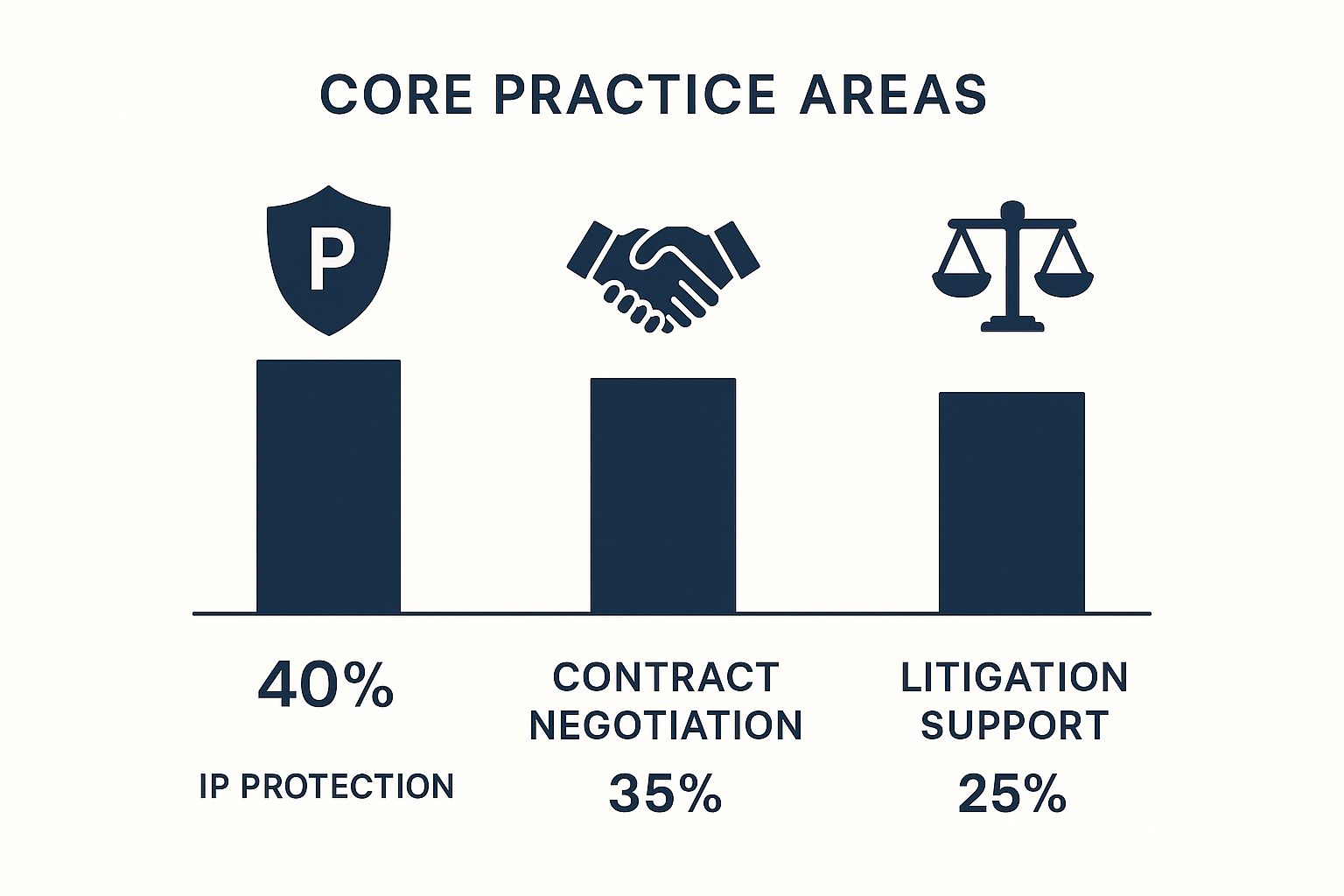The Evolution of Media and Entertainment Law Expertise
The digital age has significantly changed media and entertainment law. Media and entertainment law firms used to focus primarily on traditional contracts. Now, they must navigate a much more complex legal landscape. This includes things like cross-platform licensing, international rights management, and regulations around new technologies.
From Contracts to Complexity: The Expanding Scope of Media Law
This shift has created a noticeable gap between the expertise of general practice lawyers and the specialized needs of the entertainment industry. General practice lawyers often lack the specific understanding required to handle the unique challenges in today's entertainment world. Issues related to streaming services like Netflix, user-generated content disputes, and the legalities of virtual reality require specialized knowledge. This knowledge directly impacts creative protection and how artists make money from their work.

The infographic above shows the core practice areas of a modern media and entertainment law firm. These areas are divided into Intellectual Property (IP) Protection, Contract Negotiation, and Litigation Support. IP Protection represents the largest portion of a media lawyer’s work. This highlights its crucial role in the field and emphasizes the growing importance of protecting creative work.
Large firms like Greenberg Traurig demonstrate the industry's reliance on expertise. With over 2,500 attorneys globally, their media and entertainment division handles various sectors, from film and music to virtual reality. They advise both talent and industry clients on topics like content licensing and intellectual property rights. Learn more about these industry leaders here.
To further illustrate the differences in services offered, let's take a look at the following table:
Services Offered by Modern Media and Entertainment Law Firms
This table outlines the comprehensive services that specialized media and entertainment law firms provide compared to general practice firms.
| Service Category | Specialized Media Law Firm | General Practice Firm |
|---|---|---|
| Intellectual Property Protection (Copyright, Trademark, etc.) | Extensive experience with entertainment-specific IP issues (e.g., rights of publicity, fair use in creative contexts) | Basic IP knowledge, but may lack in-depth understanding of entertainment industry nuances |
| Contract Negotiation (Talent Agreements, Licensing Deals) | Deep understanding of industry-standard contracts and negotiation tactics | General contract knowledge, but may not be familiar with specific entertainment industry clauses and practices |
| Litigation Support (Copyright Infringement, Defamation) | Expertise in handling entertainment-related lawsuits, including pre-litigation strategies and courtroom representation | General litigation experience, but may lack specific knowledge of entertainment law precedents and strategies |
| Regulatory Compliance (FCC Regulations, FTC Guidelines) | Up-to-date knowledge of media-specific regulations | May have limited understanding of entertainment-specific regulatory requirements |
| International Rights Management | Experience navigating international copyright treaties and cross-border licensing | May require additional expertise for international matters |
This table clearly highlights the specialized expertise a dedicated media and entertainment firm brings to the table, exceeding the capabilities of a general practice firm in navigating the complexities of this industry.
The Rise of Specialized Expertise: Meeting the Demands of a Changing Industry
As the industry expands, so does the need for specialized knowledge. Dedicated media law practices have emerged to meet these demands. They offer specific expertise in areas that traditional legal practices may overlook. This includes complex issues like clearing rights for distribution across multiple platforms and the details of international copyright law. The constant development of new technologies requires constant adaptation and learning within this legal field.
Beyond Traditional Practice: The Modern Media Law Firm
The digital age also presents new challenges related to online defamation, privacy rights, and the use of personal data in entertainment. Media and entertainment law firms must be well-versed in online content regulations and the complexities of international data privacy laws. The modern media law firm provides a crucial connection between creative work and the increasingly complex legal frameworks that govern it.
Essential Practice Areas That Define Entertainment Legal Excellence

A top media and entertainment law firm sets itself apart through expertise in certain core practice areas. These areas are fundamental to their client representation and directly affect client success. Let's explore these key disciplines.
Intellectual Property Protection: Safeguarding Creative Assets
At the very heart of entertainment law is intellectual property (IP). A specialized media and entertainment law firm grasps the nuances of copyright registration, trademark enforcement, and publicity rights management specific to creative industries. Protecting a song's copyright, for example, differs greatly from copyrighting software.
These firms help artists and creators protect their original works from unauthorized use and exploitation, ensuring creators maintain control and can profit from their artistic creations. This control is essential in the entertainment industry, where creative output is often the most valuable asset.
Contract Negotiation: Crafting Agreements For Success
Contract negotiation is another cornerstone of entertainment law. Entertainment law firms are highly skilled in drafting and negotiating many different kinds of agreements, such as talent agreements, production deals, and distribution arrangements.
These contracts are crucial for establishing clear rights, responsibilities, and payment structures. They also offer a framework for resolving disagreements, ensuring everyone involved is protected. A well-drafted film distribution contract, for instance, can detail profit-sharing models and prevent future disputes. This meticulous approach protects clients across all platforms, both established and emerging.
Litigation Support: Resolving Disputes in the Entertainment World
Top media and entertainment law firms also provide strong litigation support. This involves managing infringement claims, defamation lawsuits, and other complex industry disputes. Litigation can be both expensive and time-consuming, so experienced legal counsel is essential.
These firms possess a deep understanding of entertainment law, vital for representing clients effectively in court. This specialized knowledge enables them to build strong legal strategies, protecting their clients' interests and professional reputations.
To further illustrate the reach of these practice areas, consider the following table:
Essential Practice Areas for Media and Entertainment Law Firms
This table presents the critical legal practice areas within media and entertainment law and their importance to different industry segments.
| Practice Area | Film Industry | Music Industry | Digital Media | Publishing |
|---|---|---|---|---|
| Intellectual Property Protection | Crucial for protecting film scripts, scores, and characters | Essential for safeguarding song compositions, recordings, and artist images | Vital for securing rights to online content, software, and digital platforms | Key for protecting book manuscripts, illustrations, and author rights |
| Contract Negotiation | Used for film production deals, actor agreements, and distribution contracts | Necessary for recording contracts, publishing agreements, and touring agreements | Fundamental for website terms of service, content licensing, and influencer agreements | Critical for author-publisher agreements, licensing deals, and subsidiary rights agreements |
| Litigation Support | Required for resolving copyright disputes, contract breaches, and defamation suits | Needed for addressing infringement claims, royalty disputes, and contract disagreements | Essential for handling online defamation, intellectual property theft, and data breaches | Important for resolving plagiarism claims, copyright disputes, and contract breaches |
This table highlights how these core practice areas are interwoven into the fabric of the entertainment world, impacting every facet of creative endeavors.
These three core areas—Intellectual Property Protection, Contract Negotiation, and Litigation Support—combine to offer complete legal solutions for those in the entertainment industry. Choosing a firm with demonstrable excellence in these areas can significantly impact a client’s career or business, allowing them to focus on their creative pursuits with the peace of mind that their legal needs are being met.
Finding the Perfect Media and Entertainment Law Partner
Choosing the right legal team for your creative projects is more than just finding a firm with "entertainment" in its name. It requires careful consideration of the firm's specific industry knowledge, experience with similar clients, and understanding of the legal complexities related to your objectives. This means looking at their past successes, their network within the industry, and their grasp of both established laws and emerging trends.
Evaluating Expertise and Experience in Media and Entertainment Law
When selecting a media and entertainment law firm, prioritize demonstrable experience in your particular niche. For a musician, this could mean seeking a firm with a proven track record in music licensing and royalty disputes. For a filmmaker, experience with film distribution agreements and copyright infringement cases would be more pertinent. Reviewing a firm's history with similar cases can provide insights into how they might approach your legal matters. This focused approach ensures the firm truly understands the distinct challenges you may face.
Consider the firm's industry connections as well. A firm with established relationships within the entertainment industry can provide valuable access and opportunities that extend beyond traditional legal counsel. This might include introductions to potential collaborators or investors, or even support during negotiations with distributors or studios. For a deeper dive into what to look for, you might be interested in: What is an Entertainment Lawyer?.
When choosing a legal partner, don't overlook their online presence. A firm's proficiency in SEO for Law Firms can be a good indicator of their modern, proactive approach.
Key Questions to Ask Potential Legal Counsel
During initial consultations, ask direct questions to assess the firm's suitability. Inquire about their specific experience in your area of entertainment, their client communication style, and their approach to cases similar to yours. Pay close attention to how they respond. Do they provide clear, concise answers or offer vague, generalized statements? Are they upfront about their fees and billing practices? Honest and open communication is crucial for a successful attorney-client relationship.
Recognition in industry publications can also highlight leading entertainment lawyers. The Lawdragon 500, for instance, identifies top lawyers in entertainment, sports, and media, covering various legal areas. This includes experts like Sarah Graham and John Berlinski, recognized for their broad expertise in areas like intellectual property and antitrust issues. Learn more about leading legal professionals in the field here.
Identifying Red Flags and Making Informed Decisions
Beware of firms that overpromise outcomes or minimize potential difficulties. A reputable firm will honestly evaluate your situation and outline possible legal strategies, including the inherent risks. They will also attentively listen to your needs and objectives, ensuring their legal advice aligns with your overall vision. A good fit is about finding a firm whose expertise and approach resonate with your specific requirements and instill confidence as you navigate the legal complexities of the entertainment industry. Finding the right partner is about finding a firm that understands your vision and works collaboratively with you to achieve it.
How Top Firms Navigate Entertainment Industry Disruption

The entertainment world is in constant flux. How are leading media and entertainment law firms helping their clients not just survive, but thrive? It all begins with understanding the evolving challenges and crafting effective legal strategies for today's complex entertainment landscape.
Addressing the Challenges of Streaming and Social Media
Forward-thinking legal teams are pioneering new approaches to address the unique issues presented by streaming platforms, social media, and user-generated content. For instance, intellectual property protection has become increasingly complex in an era where content is readily shared and repurposed.
Top firms are developing innovative strategies for copyright and trademark enforcement in this digital environment. This ensures creators can protect their work while still allowing for appropriate use and collaboration online.
Top law firms need to grasp the intricacies of the industry. For a deeper dive into production companies, check out this guide on Film and Television Production Companies.
Capitalizing on New Revenue Streams While Managing Risk
These legal experts also play a vital role in helping creators monetize new revenue streams. This includes providing guidance on brand deals, sponsored content, and NFT licensing.
However, these emerging opportunities come with inherent legal risks. A skilled media and entertainment law firm helps creators navigate these complexities, enabling them to explore innovative revenue models with robust legal protection. This strategic counsel is essential for success in the dynamic entertainment market. For more on entertainment law, explore this guide on Entertainment Law in New York.
Proactive Strategies for Navigating Industry Transitions
The media and entertainment industry is constantly transforming. The growth of digital media platforms and streaming services has presented new avenues for expansion. This also necessitates specialized legal advice to manage regulatory hurdles and safeguard intellectual property.
The evolving industry landscape is expected to fuel more partnerships, joint ventures, and mergers and acquisitions. Learn more about these media trends here.
Leading media and entertainment law firms play a crucial role in advising on these complex transactions. They help clients navigate these transitions effectively, protecting both their rights and financial interests. This involves assisting with contract negotiations, due diligence, and regulatory compliance throughout the entire process. This proactive approach distinguishes successful firms and empowers their clients to flourish amidst change.
Building Powerful Attorney-Client Relationships in Entertainment

The entertainment industry fosters a unique dynamic between attorneys and their clients, demanding a different approach than traditional legal fields. This section explores how successful media and entertainment law firms cultivate strong, lasting partnerships with clients ranging from individual creators to large studios and media platforms.
Balancing Legal Expertise With Creative Vision
Effective entertainment lawyers recognize that legal protection is just one piece of the puzzle. They must also grasp their clients' creative vision and business objectives. This requires balancing rigorous legal work with a keen understanding of the industry's creative and commercial forces.
This balanced approach ensures lawyers not only protect their clients legally but also empower them to achieve artistic and business aspirations. For example, a lawyer working with a musician needs to understand music licensing and royalty agreements. Just as importantly, they should appreciate the artist’s creative process and career goals. This comprehensive view allows for tailored legal guidance.
Navigating Challenges and Expectations in Entertainment Law
Open communication and expectation management are crucial for a healthy attorney-client relationship in entertainment. The industry's fast-paced, unpredictable nature demands transparency. Successful relationships are built on clearly defined expectations and proactive communication from the attorney.
Attorneys should clearly explain complex legal concepts in an accessible way. They should also provide regular case updates and proactively address potential issues. These practices build trust and prevent misunderstandings that could hinder the client’s success.
Strategic Guidance Beyond Legal Considerations
The best entertainment law firms offer guidance that goes beyond purely legal matters. They act as strategic advisors, helping clients make informed decisions. This might involve connecting clients with industry professionals, offering market insights, or advising on contract negotiations.
Top firms recognize the importance of networking. They often connect clients with producers, agents, and other key players. However, they maintain professional boundaries, ensuring these connections are ethical and serve the client’s best interests.
Building Trust and Long-Term Partnerships
Ultimately, strong attorney-client relationships in entertainment hinge on trust. Clients need to believe their lawyer understands their needs and is committed to their interests. This trust is built through open communication, proactive advice, and a demonstrated understanding of the industry's unique challenges.
By focusing on these elements, leading firms cultivate long-term partnerships built on mutual respect, shared goals, and a deep understanding of the ever-evolving entertainment world. This collaborative approach ensures clients receive the legal and strategic guidance they need to thrive.
The Future of Media and Entertainment Legal Practice
The media and entertainment industry is constantly changing, bringing exciting new opportunities along with some significant legal hurdles. This section explores how new developments, like artificial intelligence, blockchain technology, and immersive media, are reshaping the legal landscape and how specialized firms are adapting.
Emerging Technologies and Unprecedented Legal Questions
New technologies like artificial intelligence (AI) and blockchain are raising novel legal questions requiring specialized expertise. For instance, AI-generated content brings up complex issues around copyright ownership and creators' rights. Similarly, using blockchain for media distribution adds complications to digital rights management and royalty payments. Firms need a deep understanding of these technologies to effectively advise clients navigating these uncharted legal waters. You might be interested in: Music Law Firms NYC.
NFTs, Decentralized Platforms, and Cross-Border Regulations
Forward-thinking media and entertainment law firms are proactively developing expertise in areas like non-fungible tokens (NFTs), decentralized content platforms, and cross-border streaming regulations. NFTs present unique challenges related to intellectual property rights and ownership in the digital art and collectibles market.
Decentralized platforms raise questions surrounding content moderation and liability. And with the growing globalization of media consumption, firms must understand and navigate international legal frameworks. Staying ahead of these trends allows firms to guide clients as these areas grow in importance.
Globalization and the Need for International Capabilities
The global reach of media consumption is pushing entertainment law firms to develop international expertise. This includes forming strategic partnerships with firms in other countries and recruiting talent with experience in international law.
These international capabilities are crucial for assisting clients with cross-border transactions, licensing agreements, and disputes, ensuring they can operate effectively in the global marketplace.
Technological Investments for a Changing Landscape
Progressive media and entertainment law firms are investing strategically in technology to meet their clients' changing needs. This includes adopting new software for contract management, intellectual property tracking, and client communication. These technologies enhance efficiency, enabling firms to provide more proactive and responsive service.
Furthermore, some firms are exploring AI-powered tools for legal research and analysis. By embracing technology, leading firms position themselves to handle the growing complexities of the digital entertainment world.
Contact Cordero Law today to discuss your legal needs in the ever-evolving media and entertainment landscape. Cordero Law offers innovative legal solutions tailored to the unique challenges and opportunities of this dynamic industry.
